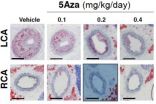(Press-News.org) The cognitive differences between humans and our closest living cousins, the chimpanzees, are staggeringly obvious. Although we share strong superficial physical similarities, we have been able to use our incredible mental abilities to construct civilisations and manipulate our environment to our will, allowing us to take over our planet and walk on the moon while the chimps grub around in a few remaining African forests.
But a new study suggests that human muscle may be just as unique. Scientists from Shanghai's CAS-MPG Partner Institute for Computational Biology, together with teams from German Max Planck Institutes, investigated the evolution of metabolites – small molecules like sugars, vitamins, amino acids and neurotransmitters that represent key elements of our physiological functions. Their study found that metabolite concentrations evolved rapidly over the course of human evolution in two tissues: in the brain and, more surprisingly, in muscle. An article describing their findings will be published on May 27th in the open-access journal PLOS Biology.
Genomes, including the human genome, accumulate changes steadily over time. Among the genetic changes that have happened over the course of human evolution, only a few might be responsible for the rise of distinct human features. To determine what other molecules played a role in human evolution, scientists began to look beyond the genome. The international team of scientists, led by Dr Philipp Khaitovich from Shanghai, examined for the first time the evolution of the human metabolome – the compendium of metabolites present in human tissues. "Metabolites are more dynamic than the genome and they can give us more information about what makes us human", says Khaitovich. "It is also commonly known that the human brain consumes way more energy than the brains of other species; we were curious to see which metabolic processes this involves."
Indeed, it turned out that unlike the uniformly-paced evolution of the genome, the metabolome of the human brain has evolved four times faster than that of the chimpanzee. What was more surprising, however, is that human muscle accumulated an even higher amount of metabolic change – ten times that of the chimpanzee!
To rule out the possibility that this change simply reflects our couch potato lifestyle, the scientists performed additional measurements in specially treated macaque monkeys. These macaques were moved from a spacious countryside facility to small indoor enclosures and served fatty and sugary food for several weeks, to imitate the environment of many contemporary humans. These lifestyle changes had only a small effect on the macaque muscle metabolome. "For a long time we were confused by metabolic changes in human muscle", says Dr Kasia Bozek, the lead author of the study, "until we realized that what other primates have in common, in contrast to humans, is their enormous muscle strength." Dr Josep Call, from the Wolfgang Kohler Primate Research Center in Leipzig, Germany, concurs: "This is common knowledge to all the zoo keepers, but it was never tested systematically." To prove their point, researchers involved several chimpanzees, macaques, university students, and even professional athletes in a pulling strength competition. Despite their sweat and determination, all of the human participants of the experiment were outcompeted by their primate opponents by more than two-fold.
A tantalizing hypothesis suggested by the scientists is that the metabolic roles of human brain and brawn are intertwined. "Our results suggest a special energy management in humans, that allows us to spare energy for our extraordinary cognitive powers at a cost of weak muscle", summarizes Dr Kasia Bozek. "The world of human metabolomics is just starting to open up its secrets to us", adds Dr Patrick Giavalisco, who led the metabolome measurement effort at the Max Planck Institute for Molecular Plant Physiology in Golm. "Such human-specific metabolic features we find could be related not only to physical or cognitive performance but also to common human metabolic diseases".
INFORMATION:
Please mention PLOS Biology as the source for this article and include the links below in your coverage to take readers to the online, open access articles
All works published in PLOS Biology are open access, which means that everything is immediately and freely available. Use this URL in your coverage to provide readers access to the paper upon publication:
http://www.plosbiology.org/article/info:doi/10.1371/journal.pbio.1001871
Contact:
Philipp Khaitovich
CAS Key Laboratory of Computational Biology
CAS-MPG Partner Institute for Computational Biology
Shanghai City, China
khaitovich@eva.mpg.de
Citation:
Bozek K, Wei Y, Yan Z, Liu X, Xiong J, et al. (2014) Exceptional Evolutionary Divergence of Human Muscle and Brain Metabolomes Parallels Human Cognitive and Physical Uniqueness. PLoS Biol 12(5): e1001871. doi:10.1371/journal.pbio.1001871
Funding:
This study was supported by the National Natural Science Foundation of China (grant numbers 31171232, 31250110071, Y23DC41301) and Ministry of Science and Technology of China (grant number 2012DFG31940), National Science Foundation (grant BCS-0824531) and James S. McDonnell Foundation (grants 22002078 and 220020293). PK was supported by the Foreign Expert 1000 Talents Plan program; KB was supported by a Chinese Academy of Sciences fellowship (2011Y1SB06). The funders had no role in study design, data collection and analysis, decision to publish, or preparation of the manuscript.
Competing Interests:
The authors have declared that no competing interests exist.
Intertwined evolution of human brain and brawn
2014-05-28
ELSE PRESS RELEASES FROM THIS DATE:
Disturbance in blood flow leads to epigenetic changes and atherosclerosis
2014-05-28
Disturbed patterns of blood flow induce lasting epigenetic changes to genes in the cells that line blood vessels, and those changes contribute to atherosclerosis, researchers have found. The findings suggest why the protective effects of good blood flow patterns, which aerobic exercise promotes, can persist over time. An epigenetic change to DNA is a chemical modification that alters whether nearby genes are likely to be turned on or off, but not the letter-by-letter sequence itself.
The results are scheduled for publication in the Journal of Clinical Investigation.
Atherosclerosis ...
Keeping active pays off even in your 70s and 80s
2014-05-28
Older people who undertake at least 25 minutes of moderate or vigorous exercise everyday need fewer prescriptions and are less likely to be admitted to hospital in an emergency, new research has revealed.
The findings, published in the journal PLOS ONE, reinforce the need for exercise programmes to help older people stay active. It could also reduce reliance on NHS services and potentially lead to cost savings.
In the first study of its kind looking at this age group, researchers from the University of Bristol looked at data from 213 people whose average age was 78.
Those ...
Endoscopic procedure does not reduce disability due to pain following gallbladder removal
2014-05-27
In certain patients with abdominal pain after gallbladder removal (cholecystectomy), undergoing an endoscopic procedure involving the bile and pancreatic ducts did not result in fewer days with disability due to pain, compared to a placebo treatment, according to a study in the May 28 issue of JAMA.
Post-cholecystectomy pain is a common clinical problem. More than 700,000 patients undergo cholecystectomy each year in the United States, and at least 10 percent are reported to have pain afterwards. Most of these patients have no significant abnormalities on imaging or ...
Study examines variation in cardiology practice guidelines over time
2014-05-27
An analysis of more than 600 class I (procedure/treatment should be performed/administered) American College of Cardiology/American Heart Association guideline recommendations published or revised since 1998 finds that about 80 percent were retained at the time of the next guideline revision, and that recommendations not supported by multiple randomized studies were more likely to be downgraded, reversed, or omitted, according to a study in the May 28 issue of JAMA.
As adherence to recommended clinical practice guidelines increasingly is used to measure performance, ...
Penn study: Longest-lasting cardiology guidelines built on findings of randomized controlled trials
2014-05-27
PHILADELPHIA –Clinical practice guideline recommendations related to screening and treatment can change markedly over time as new evidence about best practices and clinical outcomes of various treatments emerges. In a first-of-its-kind study, Penn Medicine researchers examined high-level recommendations published by the American College of Cardiology (ACC) and the American Heart Association (AHA) between 1998 and 2007 and found that recommendations which were supported by multiple randomized controlled trials were the most "durable" and least likely to change over time. ...
Citizens help researchers to challenge scientific theory
2014-05-27
Science crowdsourcing was used to disprove a widely held theory that "supertasters" owe their special sensitivity to bitter tastes to an usually high density of taste buds on their tongue, according to a study published in the open-access journal Frontiers in Integrative Neuroscience.
Supertasters are people who can detect and are extremely sensitive to phenylthiocarbamide and propylthiouracil, two compounds related to the bitter molecules in certain foods such as broccoli and kale. Supertasting has been used to explain why some people don't like spicy foods or "hoppy" ...
Study identifies risk of chemotherapy related hospitalization for eary-stage breast cancer patients
2014-05-27
Oncologists now have a new understanding of the toxicity levels of specific chemotherapy regimens used for women with early stage breast cancer, according to research from The University of Texas MD Anderson Cancer Center.
The retrospective study, published in the Journal of Clinical Oncology, used large population-based data to compare the risk of hospitalization for six common chemotherapy regimens. Reasons for hospitalization included infection, fever, anemia, dehydration, neutropenia (low white blood cell count), thrombocytopenia (low blood platelets) and delirium. ...
Quantity, not quality: Risk of sudden cardiac death tied to protein overproduction
2014-05-27
A genetic variant linked to sudden cardiac death leads to protein overproduction in heart cells, Johns Hopkins scientists report. Unlike many known disease-linked variants, this one lies not in a gene but in so-called noncoding DNA, a growing focus of disease research. The discovery, reported in the June 5 issue of The American Journal of Human Genetics, also adds to scientific understanding of the causes of sudden cardiac death and of possible ways to prevent it, the researchers say.
"Traditionally, geneticists have studied gene variants that cause disease by producing ...
FDA approves many drugs that predictably increase heart and stroke risk
2014-05-27
The agency charged to protect patients from dangerous drug side effects needs to be far more vigilant when it comes to medications that affect blood pressure.
Robert P. Blankfield, MD, MS, a clinical professor of family medicine, issues this call to the U.S. Food and Drug Administration (FDA) in an editorial published recently in an online edition of the Journal of Cardiovascular Pharmacology and Therapeutics; the print version of the article is expected to appear this autumn.
The editorial notes that several medications survived FDA scrutiny, only to be pulled from ...
JCI online ahead of print table of contents for May 27, 2014
2014-05-27
Disturbed blood flow induces epigenetic alterations to promote atherosclerosis
Arterial hardening, also known as atherosclerosis, is the result of plaque buildup in the walls of arteries and over time can lead to cardiovascular complications, including heart attack, stroke, and peripheral vascular disease. Atherosclerotic plaques typically develop in arterial regions with disrupted blood flow. While blood flow disturbances are known to alter endothelial gene expression and function, it is not clear how altered blood flow induces these changes in endothelial cells. In ...



